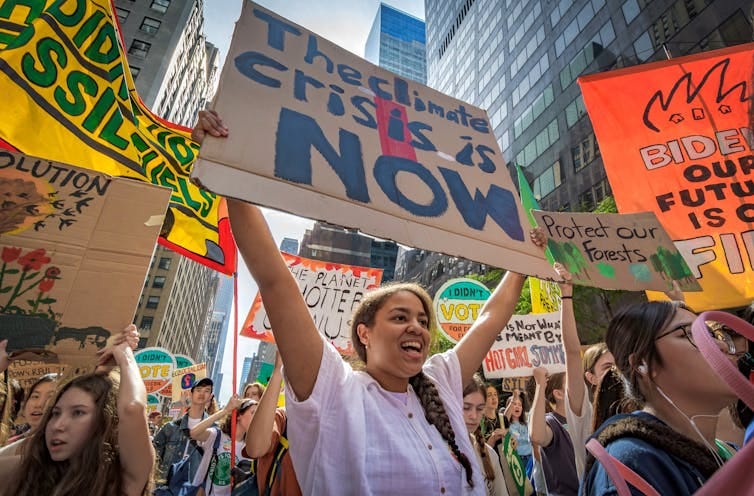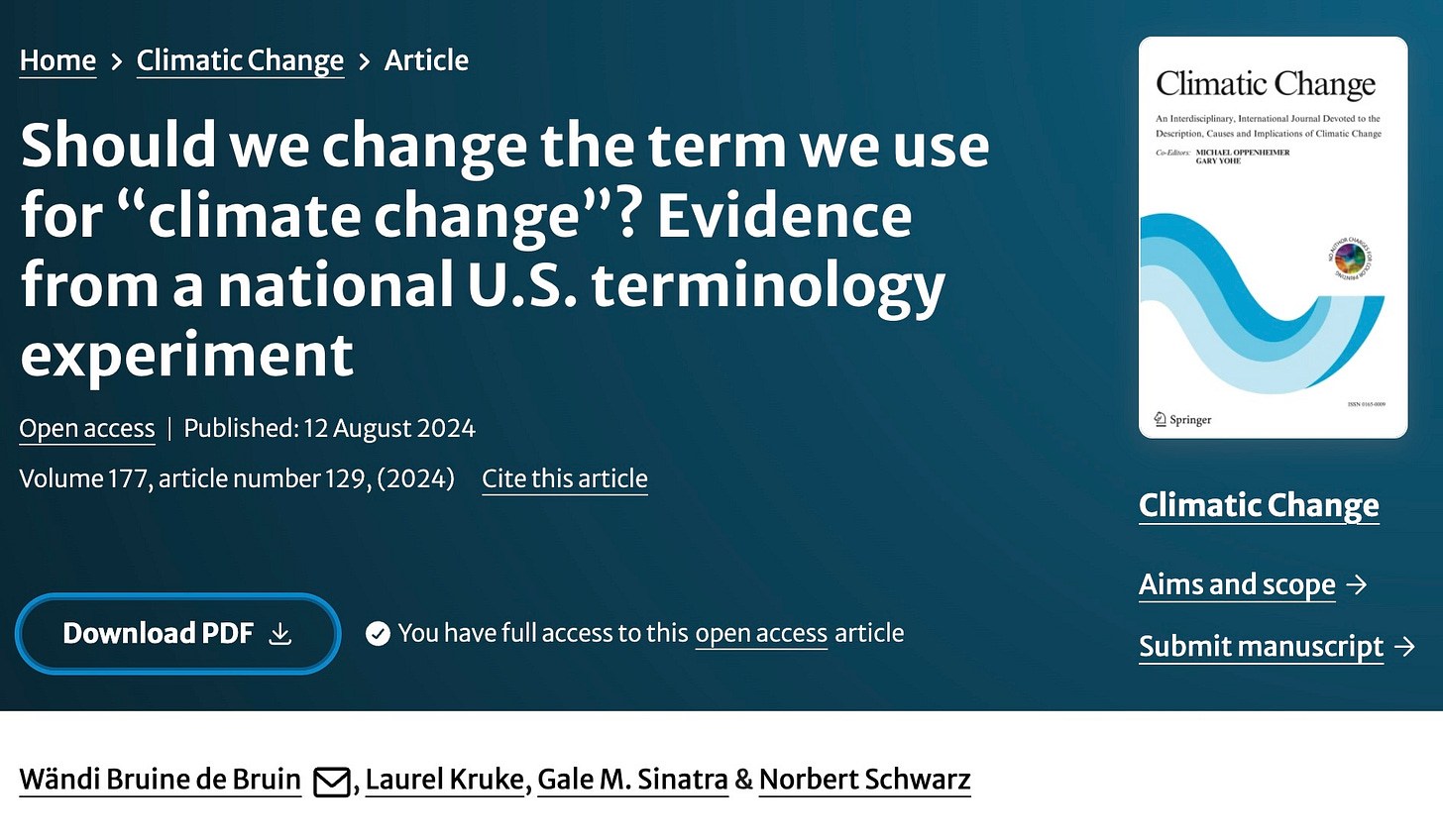New Study has a Message for Folks Shouting Emergency, Crisis, Breakdown, Justice: Just Call it Climate Change
I’m pretty sure my first article on debates over what language to use to gain public and policy traction on climate change was this one on Dot Earth in 2008. I explored a host of competing ideas and recommendations, from John Holdren’s “global climate disruption” to Simon Billinge’s “global heating” to Seth Godin’s semi-tongue-in-cheek “atmosphere cancer.”
I’ve dug in on this question many times since as ever more efforts have piled up to jog climate action with words. The most injudicious such effort, to my mind, was the decision by The Guardian in 2019 to update its style book strongly advising its reporters and editors to avoid “climate change” altogether in favor of “climate breakdown” or “climate crisis” or “climate emergency.”
Keep it simple
A new study of the influence of a batch of these phrases on survey participants, published this week in Climatic Change, says sticking with the status quo, boring “climate change” and “global warming” are the best bet.
The study is by four social scientists at the University of Soutnern California. Here’s a brief clear excerpt:
In a national experiment, we randomly assigned a national sample of 5,137 U.S. residents to “climate change,” “global warming,” “climate crisis,” “climate emergency,” or “climate justice” and examined their responses. Overall, “climate change” and “global warming” were rated as most familiar and most concerning, and “climate justice” the least, with ratings for “climate crisis” and “climate emergency” falling in between. Moreover, we find no evidence for “climate crisis” or “climate emergency” eliciting more perceived urgency than “climate change” or “global warming.”
Below you can read an explainer written by two of the authors, Wändi Bruine de Bruin and Gale Sinatra, in The Conversation and reposted here with permission. Their core message to us all is:
Don’t make the mistake of using overheated language. Just stick with familiar terms that people understand – use global warming when referring to rising temperatures and climate change for overall changes in the climate.
Climate justice - goal, not message
Before you read their post, do consider what the veteran progressive-policy publicist David Fenton told me on Sustain What about one of the alternatives this study tested: “climate justice.” Here’s the full conversation but just listen to this short excerpt:
Here’s The Conversation post by the authors of the new study:
If you want Americans to pay attention to climate change, just call it climate change

Wändi Bruine de Bruin, USC Dornsife College of Letters, Arts and Sciences and Gale Sinatra, University of Southern California
You probably have been hearing phrases like “climate crisis,” “climate emergency” or “climate justice” more often lately as people try to get across the urgent risks and consequences of climate change. The danger is real, but is using this language actually persuasive?
It turns out that Americans are more familiar with – and more concerned about – climate change and global warming than they are about climate crisis, climate emergency or climate justice, according to a recent survey we conducted with a nationally representative sample of 5,137 Americans.
Moreover, we found no evidence that the alternative terms increased people’s sense of urgency, willingness to support climate-friendly policies or willingness to act.
The familiar terms – climate change and global warming – did at least as well, and sometimes better, than climate crisis and climate emergency in eliciting concern, perceived urgency and willingness to act. Climate justice consistently tended to do worse, likely in part because it was the least familiar. The responses were similar among Republicans, Democrats and independents.
Just keep it simple
In our work as research psychologists, we have explored how Americans respond to the ways climate change is communicated and have uncovered a need to use straightforward language.
For example, people we interviewed for a study published in 2021 felt that climate experts were talking over their heads with terms like “adaptation,” “mitigation,” “sustainability” and “carbon-dioxide removal.” They wanted experts to use more familiar terms instead.
This inspired us to write a quick guide to climate jargon, published in The Conversation. Using everyday language makes information easier to understand, and even highly educated people tend to prefer it.
Yet, experts often use complex jargon because it is familiar to them, and they may not realize it is unfamiliar to others.
How the terms evolved
It has become common to talk about climate change and global warming as if they have the same meaning, but there are differences. Climate change refers to changes in the overall climate, while global warming refers specifically to rising temperatures.
A historical review found that, in the past, people were less likely to associate the term climate change with the idea that humans are actively warming the planet than they were with the term global warming. Perhaps this is why Democrats used to like the term global warming, while the popularization of the term climate change has been credited to Frank Luntz, an adviser to the George W. Bush administration.
Past surveys also found that Democrats used to think of global warming as being more serious than climate change, while Republicans thought of climate change as more serious than global warming. But according to a recent review, these partisan differences have now faded, and a majority of Republicans and Democrats tend to express concern about both terms.
Alternative terms such as climate crisis, climate emergency and climate justice have been used to emphasize other aspects of climate change and to try to raise concern. In 2019, the British newspaper The Guardian switched to using climate crisis and climate emergency because it wanted to convey urgency.
Activists use the term climate justice to draw attention to climate change as a human rights challenge: Low-income people around the world suffer the most from the effects of climate change, despite being the least responsible for causing it.
The takeaway: Avoid overheated language
Right now, the terms climate crisis, climate emergency or climate justice are less familiar and elicit less concern than climate change or global warming.
Even if these terms become more commonplace, there is no guarantee that they will heighten concern or inspire action. In fact, studies have suggested that phrases like climate crisis could backfire if they don’t resonate with people.
Our advice: Don’t make the mistake of using overheated language. Just stick with familiar terms that people understand – use global warming when referring to rising temperatures and climate change for overall changes in the climate.
~~
Wändi Bruine de Bruin, Director of Behavioral Science & Policy Initiative, Schaeffer Institute of Public Policy & Government Service, USC Price School of Public Policy, USC Dornsife College of Letters, Arts and Sciences and Gale Sinatra, Professor of Education and Psychology, University of Southern California
This article is republished from The Conversation under a Creative Commons license. Read the original article.







Andrew,
If only your effort in 2008 to change the language had been successful.....
I was dragged into the fray about that time by my students who kept referencing Al Gore's movie "An Inconvenient Truth" and the ensuing and escalating dystopian headlines. My graduate field biology and love of nature, and my evolutionary biology studies with a time frame of millions of years was no match for the crisis narratives that were capturing the liberal media, and the fundraising appeals of all my favorite environmental organizations- WWF, an early casualty, then Audubon, and finally Nature Conservancy. Teaching climate science, my emphasis on observation, measurement, data, and scientific method, was no match for consensus science based on the "evidence" of models.
The liberal media, my liberal media, had heeded Al Gore's claim that climate crisis was no longer a matter of science, but of morality. The United Nations quickly joined that view. This media, my media, was promoting a binary understanding- that if you criticized consensus science, you were called the ridiculous term, a "climate denier". NYT, WAPO, and their copycats were beginning to sometimes call any such criticism, a crime against humanity. Some of us, unhappy with the binary promotion and its implications for climate science, began to call ourselves" luke warmers", acknowledging the actual data of global warming and climate change, but critical of the exaggerations and substitution of scary and unlikely models for actual scientific evidence. Many friends and family, seeing only the false binary promotion of their media, began to think of me and the climate scientists I most respected, Drs. Judith Curry and Roger Pielke Jr., as a climate deniers.
What has happened with climate blogs over the last 15 years is telling. Around 2008, I began reading those early climate blogs- Skeptical Science, What's Up With That, and Real Climate. This was before the more scientifically rigorous blogs, my favorites, Science of Doom, and Climate, Etc. appeared. I've learned from reading the above climate blogs and many others, and watching so many of them become partisan battlegrounds in a hateful morality play, what W.H. Auden wrote in his famous poem, "Sept 1, 1939", "those to whom evil is done, do evil in return". Yes, the promotion of a binary understanding and the resulting labeling of one side as criminals against humanity is more than scientific malfeasance. It has energized that side to also exaggerate, blame, and demonize. I've watched thousands of former non-partisans, for example, Anthony Watts of WUWT, who I remember writing years ago," I often vote for Democrats", become bitter after years of being ridiculed and scorned. I've watched thousands of those posting there and on other "skeptical" blogs show the same contempt for their critics that they themselves have long received.
Science is the loser. Civility is the loser. Crafting helpful bipartisan policies to lessen climate change is the loser. When Trump won in 2016, based on just a few thousands of votes in several states, I thought back to all those thousands of posts on WUWT and elsewhere by people demonized by the liberal media who had become new enemies of the Left. As November 2024 approaches, I continue to wonder and fear that it might happen again.
It's based on a poll. A poll concludes that people like things the way that they are, and they are used to "climate change," which is a terrible name developed by a Republican strategist to downplay the dangers. He succeeded! That is why we need "climate crisis."